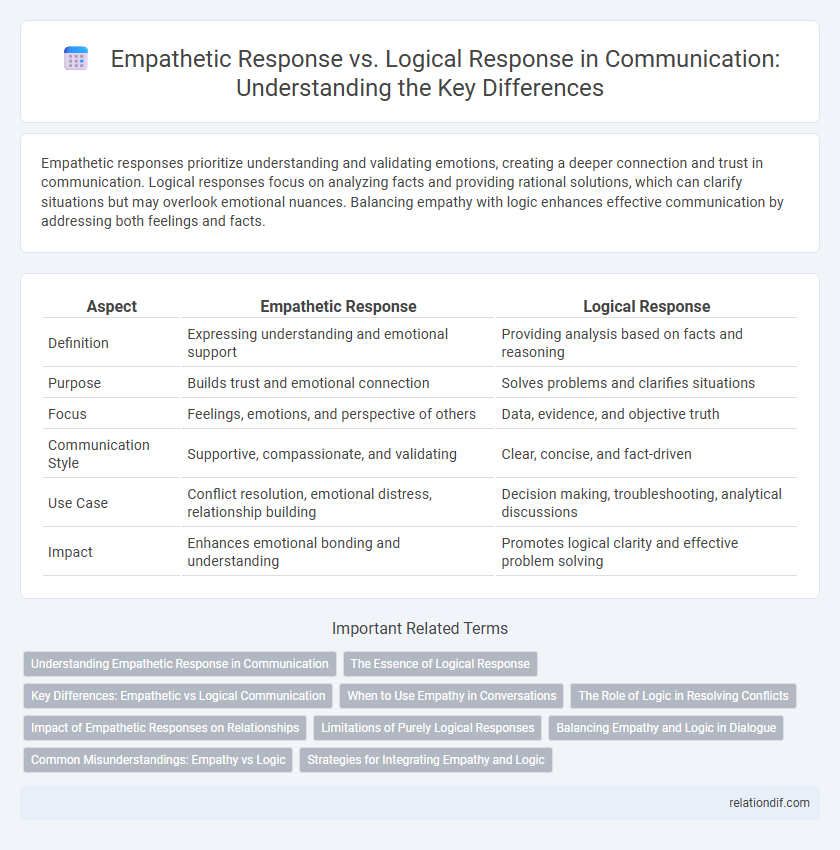Empathetic responses prioritize understanding and validating emotions, creating a deeper connection and trust in communication. Logical responses focus on analyzing facts and providing rational solutions, which can clarify situations but may overlook emotional nuances. Balancing empathy with logic enhances effective communication by addressing both feelings and facts.
Table of Comparison
| Aspect | Empathetic Response | Logical Response |
|---|---|---|
| Definition | Expressing understanding and emotional support | Providing analysis based on facts and reasoning |
| Purpose | Builds trust and emotional connection | Solves problems and clarifies situations |
| Focus | Feelings, emotions, and perspective of others | Data, evidence, and objective truth |
| Communication Style | Supportive, compassionate, and validating | Clear, concise, and fact-driven |
| Use Case | Conflict resolution, emotional distress, relationship building | Decision making, troubleshooting, analytical discussions |
| Impact | Enhances emotional bonding and understanding | Promotes logical clarity and effective problem solving |
Understanding Empathetic Response in Communication
An empathetic response in communication involves recognizing and validating the speaker's feelings, fostering trust and emotional connection. Unlike a purely logical response that prioritizes facts and solutions, empathy emphasizes active listening and emotional resonance to deepen understanding. This approach enhances relational dynamics and encourages open, supportive dialogue.
The Essence of Logical Response
Logical response centers on analyzing facts and evidence to provide clear, objective answers that prioritize accuracy and coherence. It involves critical thinking and systematic reasoning to solve problems and make informed decisions. This approach fosters clarity in communication by minimizing emotional bias and emphasizing rational understanding.
Key Differences: Empathetic vs Logical Communication
Empathetic communication centers on understanding and validating emotions, fostering trust and emotional connection by actively listening and expressing compassion. Logical communication emphasizes clear, objective reasoning and factual information to solve problems and make decisions efficiently. Key differences lie in their goals: empathy prioritizes emotional resonance while logic targets clarity and rationality.
When to Use Empathy in Conversations
Empathy should be used in conversations when emotional support and understanding are the primary needs, such as during conflict resolution, grief, or personal sharing. An empathetic response fosters trust, reduces defensiveness, and validates the speaker's feelings, leading to stronger interpersonal connections. Employ logical responses instead when problem-solving or decision-making requires clarity, objectivity, and factual analysis.
The Role of Logic in Resolving Conflicts
Effective conflict resolution often relies on logical responses that prioritize objective analysis and fact-based reasoning to identify root causes and develop practical solutions. Logic facilitates clear communication by minimizing emotional biases, enabling parties to focus on shared goals and actionable steps. While empathy builds understanding, logic drives the structure necessary for resolving disputes and achieving consensus.
Impact of Empathetic Responses on Relationships
Empathetic responses significantly strengthen relationships by fostering trust and emotional connection, which enhances mutual understanding and reduces conflict. Unlike purely logical responses, empathy validates feelings and encourages open communication, leading to deeper interpersonal bonds. Consistently practicing empathetic listening promotes psychological safety and long-term relationship resilience.
Limitations of Purely Logical Responses
Purely logical responses often overlook the emotional nuances of communication, leading to misunderstandings and a perceived lack of empathy. Emotional context plays a crucial role in fostering trust and connection, which logic alone cannot address. Ignoring feelings can result in ineffective communication, where the emotional needs of the recipient remain unmet.
Balancing Empathy and Logic in Dialogue
Balancing empathy and logic in dialogue enhances effective communication by ensuring emotional understanding aligns with rational clarity. Empathetic responses validate feelings and build trust, while logical responses provide structure and solutions. Integrating both approaches fosters meaningful interactions that respect emotions and promote problem-solving.
Common Misunderstandings: Empathy vs Logic
Empathetic responses prioritize understanding and validating emotions, while logical responses focus on analyzing facts and providing reasoned solutions. A common misunderstanding is assuming empathy lacks rationality or that logic disregards emotional experiences, when in fact effective communication balances both to foster connection and clarity. Recognizing this distinction enhances interpersonal interactions by addressing emotional needs alongside problem-solving.
Strategies for Integrating Empathy and Logic
Empathetic communication enhances understanding by validating emotions, while logical responses provide clarity and structure for problem-solving. Strategies for integrating empathy and logic include active listening combined with factual analysis, ensuring emotional concerns are acknowledged without overshadowing objective reasoning. This balance fosters trust and effective resolution in personal and professional interactions.
empathetic response vs logical response Infographic

 relationdif.com
relationdif.com